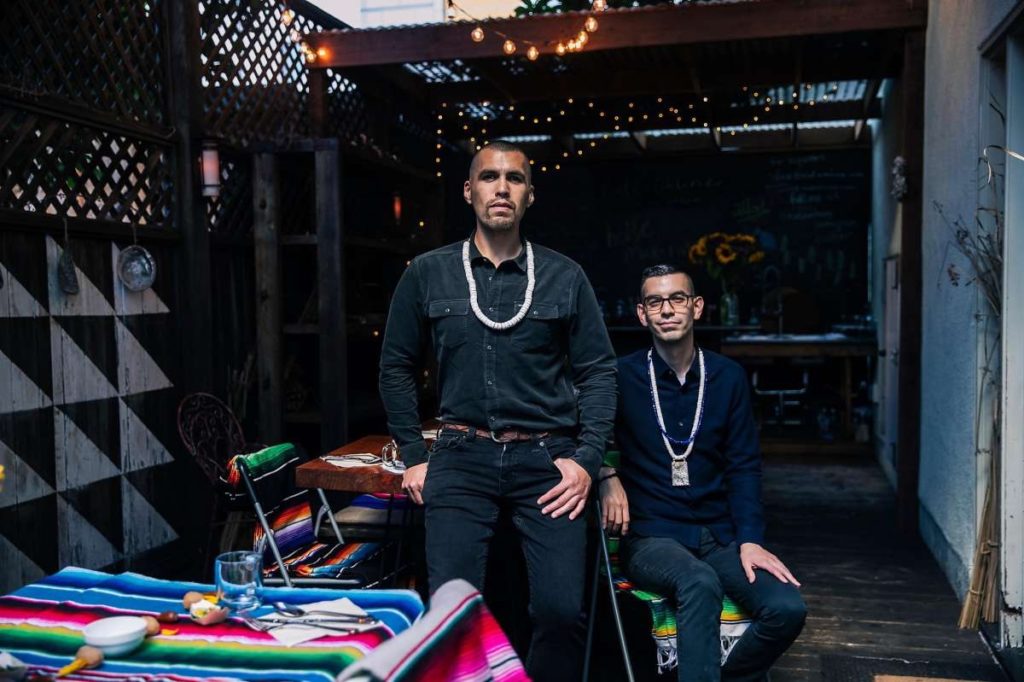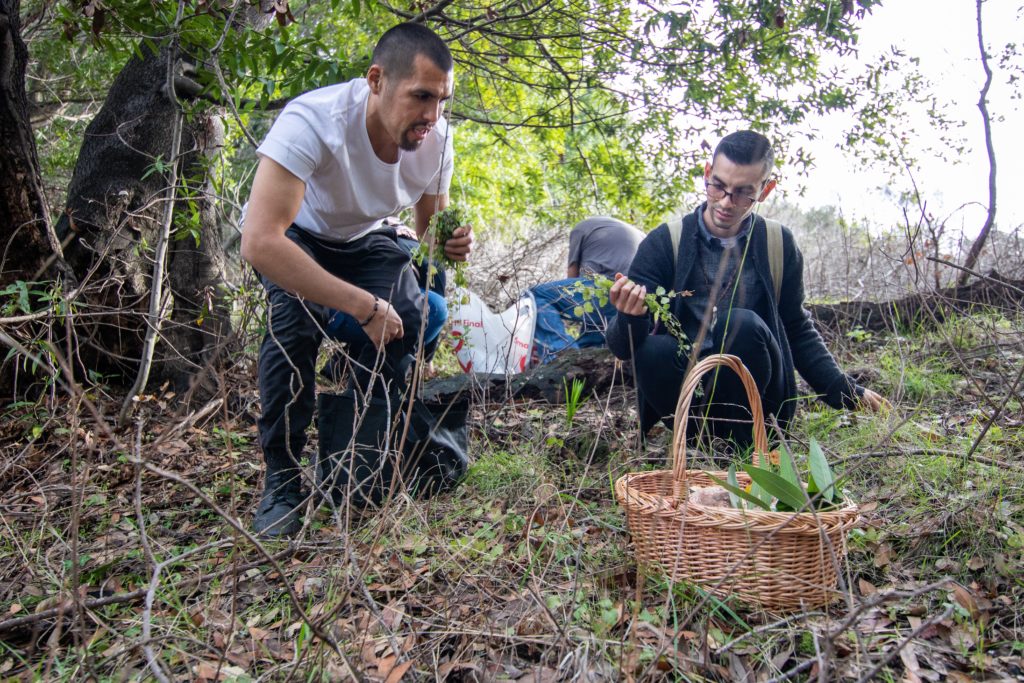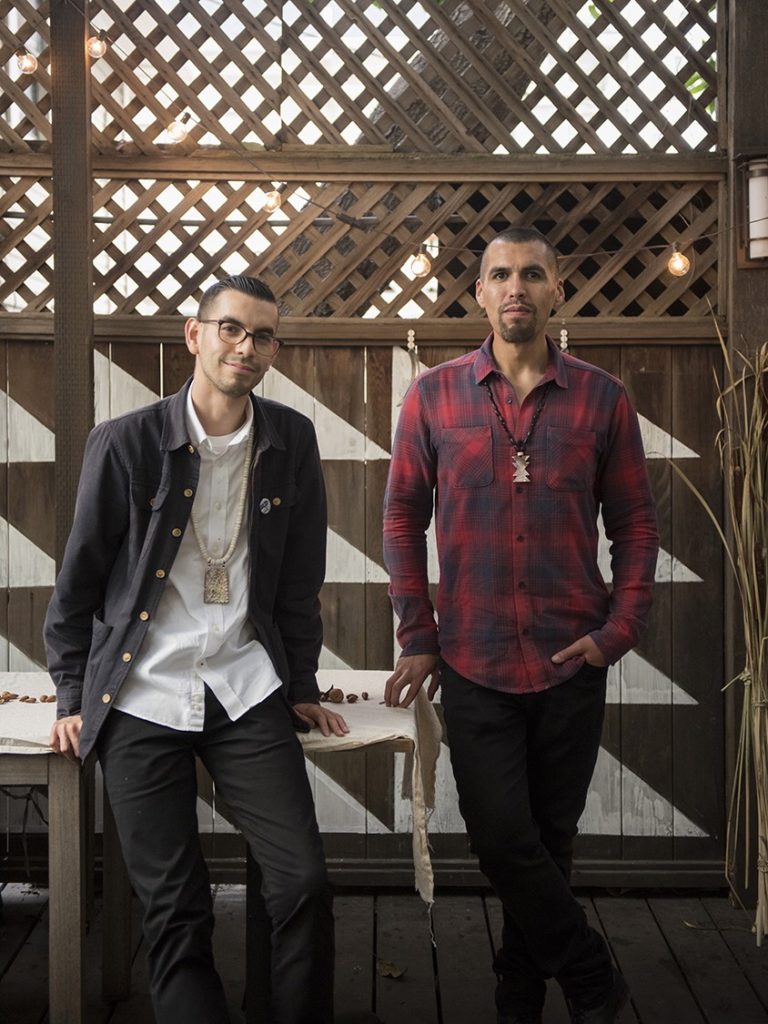Given the vastness of the Bay Area’s food scene, it can be difficult to pinpoint a singular reigning influence. The melting pot of cuisines and their corresponding origins makes for an alluring array of dining options. However, representation of one cuisine was severely lacking until just a couple of years ago: the original, pre-colonial, Indigenous Ohlone cuisine. Two Ohlone activists and chefs, Vincent Medina and partner Louis Trevino, filled this troubling gap by co-founding Cafe Ohlone. Backed by their cultural revitalization organization called mak-’amham (‘our food’ in Chochenyo Ohlone), Cafe Ohlone in xučyun (Berkeley) has been a safe haven for Medina and Trevino to practice their ancestors’ customs and share them with others. Although the COVID pandemic has changed their location and operations, the team remains committed to spreading appreciation for and awareness of Ohlone culture.
I recently had the profound pleasure of speaking with Medina and Trevino about their work in reviving their respective Ohlone cultures, which were nearly entirely suppressed through centuries of violent colonization. Medina, a member of the Muwekma Ohlone Tribe, and Trevino, a member of the Rumsen Ohlone community, both began by sharing the origins of their involvement in the culinary history of their people. Medina described how, “We both grew up in very strong families, and food has always been something that has brought our families together.” He explained the ability of food to connect different generations, and how food is connected directly to the history of the Ohlone people. “Here in my family, we’ve never left the East Bay. It’s an area that our ancestors lived in before colonization and the missions.” Trevino had a unique upbringing given the great deal of time he spent at his grandparents’ restaurant, learning the recipes of his great grandmother. He said, “I never knew her, but I knew her food. That food connected me to her.” The restaurant, he continued, “was a place that felt safe. My grandmother and I would talk, and I learned so much about our family’s history and cultural identity. It was there that she gave me a notebook filled with words recorded from the missions, filled with our personal histories, languages, and foods. Those notes are references to our older traditional foods.” Trevino and Medina are both very invested in the revitalization of their tribal languages, and as a result, have amassed tremendous knowledge about their culture and ancestral foods. The process of reconnecting with these foods is what led to the manifestation Cafe Ohlone, a space where Trevino said that their cultural identities which have been suppressed for generations can be, “elevated to the status that we know these things have always had; to give them the respect they’ve always deserved”.

Being Indigenous chefs on rightful Ohlone land is what Medina described as, “a beautiful feeling; it’s one of resilience and permanence. We know that we’re here in our place.” Trevino also reflected on how his experience with being a chef, “starts from a different place. There’s so much history and context there. Our people already had their own culinary arts.” The two activists both emphasized the interconnectedness of food, and its significance in regard to traditional languages and practices. They expressed pride in seeing their culture being amplified through their work, but also explained how they’ve lacked respect and visibility. Medina said of this, “For us, we’re trying to amplify our community’s access to our history. The truth is, those things were never gone; they were kept inward. They might have been sleeping, which means they can be re-awakened.” The lack of representation of Indigenous Ohlone culture on Ohlone land in the East Bay is ultimately what pushed Medina and Trevino to create what is now the only Ohlone cuisine-focused restaurant in the world. “There’s no reason why our food shouldn’t be celebrated outwardly as well”, Medina said, “There is every other type of food represented in the East Bay; why not Ohlone?”.
It comes as no surprise that the work Medina and Trevino are doing represents profound contributions to decolonizing the Bay Area and our food systems at large. What the pair are doing locally is extremely active, what Medina described as, “elevating the public’s consciousness, by teaching the public directly in our own words”. He continued by saying that his and Trevino’s stories have been, “entirely ignored and swept under the rug, because people don’t want to know the facts. Growing up right here… the public doesn’t see you. It’s painful not feeling seen in your own home.” Since most of what has been written and shared about the Ohlone people has been written by white people in a past-tense, Medina and Trevino feel compelled to properly introduce their communities to the public. “Colonization has done a lot of damage in painting us as something of the past. We wanted to create change in how the Ohlone way is presented. If people could hear us telling our story directly, about how our culture survived through colonization and what it was like before that for thousands of years, we can have hope”, Medina said. Although the pain that comes from ongoing colonization is one that only Indigenous peoples can fathom, the co-founders want people to also understand them in another light. Medina expressed that, “Reclaiming our land and traditions can be possible through educating the public from our side. Once people see what we’re doing, it makes sense. It’s the original culture, and there’s no reason that it can’t reemerge in the ways that it should.” He continued, “Our people have been here for thousands of years, and California only has for 170? Decolonization for the public is knowing that we’re here, and that our traditional values deserve to come back. We want people to understand and protect us. All of these things have value, and our ancestors’ ways are our ways. We know what’s meant for this area.”
Medina and Trevino do indeed know what is meant for the area and are fighting to rebuild the true origins of ‘California cuisine’. The Ohlone people were the first Bay Area inhabitants to implement organic, seasonal, and local food in their diets. The re-invention of these concepts in food without acknowledging their Indigenous origins is to partake in cultural erasure and colonization. This is an increasingly evident problem in ‘California cuisine’, where white chefs are often lauded for using principles in food sourcing and cooking that are Indigenous by nature. On this topic, Medina said how he and Trevino, “don’t cook with anything artificial. Ohlone food is inherently organic and seasonal. It’s all local. We have been working to change the narrative of how people understand these principles.” He also described how this labeling on food has become a tool of systemic injustice against BIPOC communities. “As a Brown person, growing up without a lot of resources around us, those titles associated with food often seemed unattainable. They weren’t marketed towards people like me and my family. That’s such an injustice, because these foods that have been held back from my people are inherently [our principles]”. Because of this, Medina and Trevino are trying to shape how people view local, seasonal, and organic ‘California cuisine’. Medina said that perpetuating this narrative of whitewashed California cuisine makes it, “almost as if California was a blank slate before colonizers came. For thousands of years we’ve always had this way of eating.” Trevino added to this a valuable commentary on the idea of sustainability in food, saying that this is, “inherent in our creation. Our food ways have been consistent, but representation is lacking in the mainstream food movement. People will jump on a specific food touted as being healthy, but our people never had to do that. Our food is extremely nutritious by nature”.

Foraging and hunting for food are Indigenous methods, proven sustainable by their steady practice for thousands of years pre-colonization. It is these methods that make Ohlone food inherently organic, seasonal, and nutritious, but this traditional practice of food sourcing is being made increasingly difficult through urbanization and industrial development. Medina explained how in the East Bay specifically, open spaces and land are being replaced with new apartments and corporate complexes. Gentrification and the tech boom are only amplifying this issue, which impedes Indigenous communities’ abilities to source food in the ways their ancestors did. “Development feels like a tsunami growing bigger and stronger”, Medina said, and foraging is not the only thing being compromised. “One of the things that makes [the Bay Area] special is the interconnected biodiversity here. There’s a whole range of ecosystems right next to each other. Our people’s villages would go between these areas, all of them settled by our people.” But when these richly biodiverse ecosystems are built over and destroyed, traditional foraging practices are rendered impossible in these areas. “Those landscapes need to be protected, because they foster both food and native wildlife. They also give us Ohlone people spaces to see the old landscapes as our ancestors did. Urbanization is one of our biggest barriers to traditional food gathering and preparation.” This is unfortunately true for many Indigenous peoples in colonized countries, where they have been marginalized and systematically oppressed through racism and food apartheids. In the United States alone, the rate of food insecurity amongst Native Americans is two to four times that of the general population.
Medina also gave a brief background on how foraging and gathering food has been historically criminalized. During the time of the Spanish missions, Indigenous people were punished for gathering food. “The first American government here made it legal to kill our people through genocide. Then if an Ohlone person in California wasn’t working for a white person, they could be held against their will.” He said how although these racist laws have changed over time, the government is still trying to suppress Native Americans. “It’s not just unintentional societal issues [like urbanization]; there are systemic efforts trying to hold our people down”. Because of this, when I asked Medina and Louis what they would like to pursue next in either their personal or professional endeavors, they half-jokingly answered that, “We haven’t been able to secure a large amount of land back to our people yet, so that would be nice.”
Despite the urgent issues facing the Ohlone people and Indigenous communities everywhere, Medina asserted that, “Our people are strong and refuse to leave, which is a victorious story. There is much more to this story than just sadness; it’s important for people to know that too. We’re doing what we must to keep our stories alive, so that the sacrifices of generations before us were not in vain. The heroes are our ancestors, who made our visibility possible.” Trevino and Medina are doing what they can to adapt, and said that there is no shame in adapting to their changing surroundings. “Of course, we’re modern people of the 21st century. We can do things in modern ways as long as we’re keeping our culture alive. Sometimes we need to go elsewhere to get ingredients rather than gathering, and that’s okay. If we can still taste the same flavors, it’s just about finding ways to adapt”, Medina said. The ability to adapt is something that the pair attribute to their elders, and those who pushed for change before them. “We challenge, and don’t accept injustice. We didn’t want to accept the lack of an Ohlone restaurant so now we have one. We don’t want to be told that we can’t gather, and now we have gathering permits with East Bay parks. That’s change right there”, declared Medina.

In the face of the COVID-19 pandemic, Cafe Ohlone has adapted as well. Since the closure of the bookstore that hosted the culinary pop-up, the mak-’amham team plans to reopen the cafe at a new location once it is safer. In the meantime, Medina and Trevino will begin a series of meal kits in early Fall, allowing people to experience Ohlone cuisine despite the pandemic. These meal kits will be wooden boxes filled with beautiful, seasonal ingredients that people can prepare themselves at home. Echoing the dishes of their ancestors, Cafe Ohlone’s previous menu featured freshly foraged acorns, chanterelle mushroom, elderberry, seasonal lettuces, yerba buena, and walnut oil. This next installment for Medina and Trevino will undoubtedly be equally flavorful and representative of their focus on empowering their communities and revitalizing their culture. “We do this with a lot of heart and soul, and the elders make it possible for us to do this. Our culture is beautiful, and we’ll always be here.” To keep up-to-date with Cafe Ohlone and the work of Vincent Medina and Louis Trevino, please click here.
Sierra Barsten is a recent Environmental Studies graduate from LMU, and currently works with environmental non-profits Turning Green and Herbicide-Free Campus. Her work is representative of her passions for sustainable food systems, food sovereignty, and social, racial, and environmental justice.